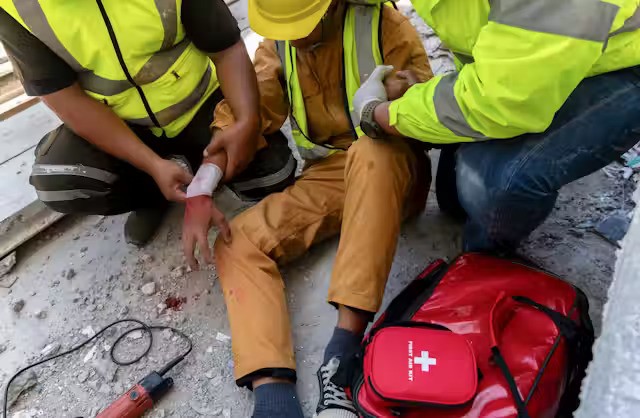A two-way street: Mental health can’t be ignored during work injury recovery

Due to increased understanding of the influence mental health has on both employee and organizational success, there has been a recent boom in discussions on mental health in the workplace. These conversations have enlightened us as occupational health experts about the causes and outcomes of mental health issues.
One such important but frequently disregarded factor is the reciprocal relationship that exists between mental health issues and work-related injuries: mental health issues can raise the risk of work-related injuries, and work-related injuries can either cause or exacerbate mental health issues.
We set out to clarify this important reciprocal relationship since it threatens the long-term viability of an organization’s most valuable resource: its workforce.
Mental health and work injuries
Workplace accidents and mental health issues cause enormous suffering for workers, their families, and larger support networks, as well as substantial expenditures for businesses and society.
Although the costs associated with mental health disorders and work-related injuries vary greatly, research suggests that combining the two can increase medical costs and missed work by a factor of two to ten.
Until date, despite their importance, the crucial connection between work-related injuries and mental health issues has only been occasionally studied by a variety of disciplines that hardly interact with one another.
Our thorough meta-analysis, which included 147 research from 1988 that included a global sample of over 1.4 million participants, emphasizes the necessity of integrated strategies to address both psychological and physical well-being in the workplace.
Our work and other meta-analytical studies are important because they systematically compile and summarize all of the quantitative research that has already been done. This method gives us a better picture of what we currently understand by combining and distilling the results from several investigations.
According to our research, a person’s experience with mental health issues or workplace injuries precedes the association between work-related injuries and mental health. When work injuries occur before mental health issues, there is a larger, more substantial relationship; yet, there is a lesser, but no less significant, association when mental health issues occur before work injuries.
The hidden toll of work injuries
Physical healing is the first priority following a work injury. But one shouldn’t ignore the psychological effects of injuries.
An unexpected work injury might produce an abrupt disruption that can exacerbate anxiety, despair, and stress. A person may experience psychological anguish due to a number of things, such as pain, stigma, and doubts about their capacity to make a living.
According to our investigation, rumination and other negative thoughts frequently occur following work-related accidents. They contribute significantly to the emergence of mental health issues. These unfavorable ideas might set off a downward spiral that imprisons the wounded person mentally and impedes their ability to heal.
Remarkably, there is reciprocity in the relationship. Additionally, our research indicates that there is a correlation between mental health issues and a higher risk of work-related injuries.
People who are mentally ill frequently have worse cognitive performance, are more easily distracted, and have difficulty making decisions, which makes performing routine job activities more demanding and challenging. These elements may increase the chance of workplace accidents.
For instance, a worker experiencing severe depression may find it difficult to focus on their work, which raises the possibility that they will miss new risks or misinterpret potentially hazardous circumstances.
The stigma attached to their mental health issue may also keep the worker from getting the support or accommodations they require, making them even more susceptible to workplace accidents.
Breaking the vicious cycle
The necessity for comprehensive rehabilitation treatments is highlighted by the interconnectedness between mental health issues and work-related injuries. In order to enhance general wellbeing and stop injuries from recurring, psychological care must be incorporated into the recovery process.
Programs that attend to employees’ physical and mental health requirements ought to be implemented by employers and legislators. This entails making mental health services accessible and widely known, encouraging a secure and encouraging work environment, and putting stress-reduction techniques into practice.
The loop of work injuries and mental health issues can be broken by adopting a human sustainability approach that prioritizes physical, psychological, and social health through prevention rather than reaction. In the end, this might result in workplaces that are healthier and more productive.
Improving human sustainability
Future investigations and treatments aiming at reducing the negative effects of occupational injuries on mental health and vice versa are made possible by our study. Creating interventions and support systems that are more effective starts with acknowledging this reciprocal link.
When creating focused therapies that address the underlying causes of these challenges, it might be helpful to understand the underlying mechanisms, such as negative attitudes and perceived job pressures.
Furthermore, knowing what influences the relationship between work-related injuries and mental health—such as the frequency or severity of injuries, the kinds of mental health issues that may surface, and particular vulnerable populations—can be extremely helpful in creating customized treatments.
We can guarantee that both components of care—physical and psychological—get the attention they merit in order to advance human sustainability and improve the standard of living for employees in all sectors of the economy.




